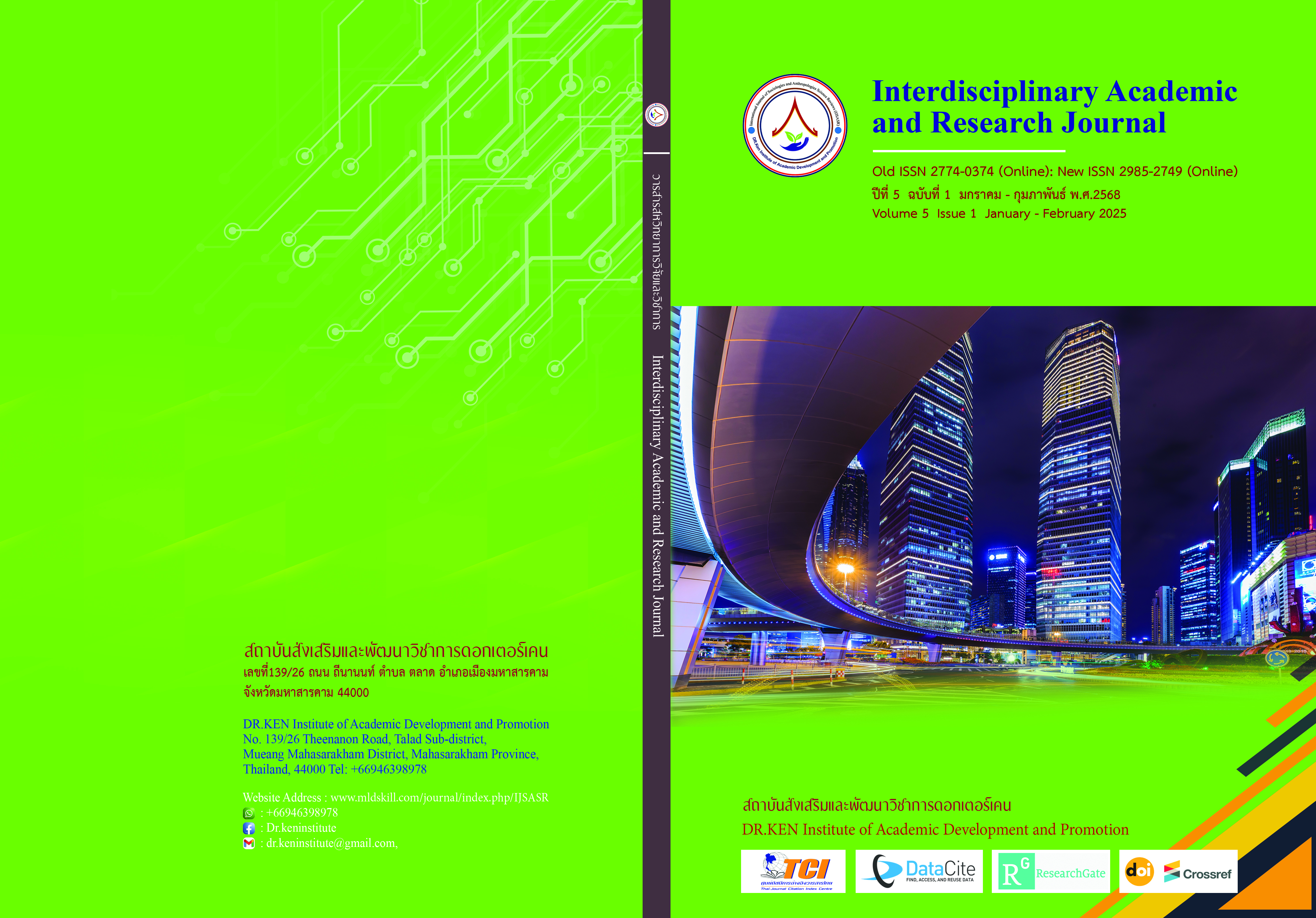Executive Leadership Affecting the Employees’ Happiness at Work Private Companies in Bangkok
DOI:
https://doi.org/10.60027/iarj.2025.284906Keywords:
Executive leadership, Happiness at work, Private companiesAbstract
Background and Aims: Executive Leadership is very important for the successful and effective management of the organization. Working within the organization must be accompanied by happiness. Because happiness affects the development of individuals and organizations in a good direction. It can also be a guideline for the future development of organizations and the country. This research aimed to (1) personal factors affecting the employees’ happiness at work private companies in Bangkok and (2) the executive leadership level affecting the employees’ happiness at work private companies in Bangkok.
Methodology: It is quantitative research. This study used a sample of 385 employees of private companies in Bangkok. The sample size was calculated using Cochran's formula. By setting a confidence level of 95 percent and an error level of 5 percent and using the accidental sampling method. The research instrument used for data collection was a questionnaire. Data analysis statistics included frequency, percentage, mean, standard deviation, T-value, and F-value tests.
Results: (1) The majority of the respondents were female, accounting for 64.9 percent, aged 30-39 years, accounting for 38.0 percent, were married, accounting for 54.5 percent, had a bachelor's degree, accounting for 50.9 percent, had 10 years or more of work experience, accounting for 34.5 percent, and had a monthly income of 15,001 - 20,000 baht, accounting for 43.6 percent and (2) the executive leadership level, Overall it was at a high level ( = 3.92, S.D = .847). The aspect with the highest mean score was supportive leadership followed by participative leadership and achievement leadership. The aspect with the lowest mean score was directive leadership ( = 3.90, S.D = .843).
Conclusion: (1) personal factors of employees in private companies in Bangkok with different ages, status, education levels, work experience, and monthly income have different effects on their happiness at work, statistically significant at the 0.05 level, and (2) the executive leadership affected the employees’ happiness at work private companies in Bangkok consisted of supportive leadership and participative leadership affected the employees’ happiness at work private companies in Bangkok Consists of supportive leadership and participative leadership.
References
จันทรัตน์ ชนมงคล. (2563). ปัจจัยที่มีผลต่อความสุขในการทำงานของบุคลากร สำนักงานเขตคลองสามวา. วิทยานิพนธ์รัฐประศาสนศาสตรมหาบัณฑิต สาขาวิชารัฐประศาสนศาสตร์ มหาวิทยาลัยเกษมบัณฑิต.
ณัฐชนนท์ คงอยู่. (2565). การใช้อำนาจของผู้บริหารกับความสุขในการทำงานของครูในสถานศึกษา สังกัดสำนักงานเขตพื้นที่การศึกษาประถมศึกษาสุพรรณบุรี เขต 2. วิทยานิพนธ์ปริญญาศึกษาศาสตรมหาบัณฑิต คณะศึกษาศาสตร์ มหาวิทยาลัยศิลปากร.
นฤมล เพ็ญสิริวรรณ. (2562). ปัจจัยที่ส่งผลต่อภาวะผู้นำของผู้บริหารเทศบาลตำบลในจังหวัดนนทบุรี. วารสารมหาจุฬานาครทรรศน์, 6(10), 2641-5658.
เนตร์พัณณา ยาวิราช. (2556). ภาวะผู้นำและผู้นำเชิงกลยุทธ์. พิมพ์ครั้งที่ 8. กรุงเทพฯ: ทริปเพิ้ล.
รวินันท์ สุดเจริญ. (2563). การศึกษาความสุขในการทํางานของบุคลากรองค์การบริหารส่วน จังหวัดสมุทรสาคร. วารสารโครงการทวิปริญญาทางรัฐประศาสนศาสตร์และธุรกิจบัณฑิต คณะรัฐศาสตร์ มหาวิทยาลัยรามคำแหง. Retrieved from: http://www.mpa-mba.ru.ac.th/images/Project/treatise_bangkok14_09092021/6217950052.pdf
รุจิกร ตุลาธาร. (2565). ภาวะผู้นำการเปลี่ยนแปลงของผู้บริหารกับการเป็นองค์กรแห่งความสุขของโรงเรียนสังกัดสำนักงานเขตพื้นที่การศึกษามัธยมศึกษากาญจนบุรี. คณะศึกษาศาสตร์ มหาวิทยาลัยศิลปากร.
วิโรจน์ สารรัตนะ. (2557). ภาวะผู้นำ ทฤษฎี และนานาทัศนะร่วมสมัยปัจจุบัน. กรุงเทพฯ: ทิพยวิสุทธิ์.
วีรภัทร สภากาญจน์ (2565). การสร้างความสุขในการทำงานยุค NEW NORMAL. วารสาร มจร. สังคมศาสตร์ปริทรรศน์, 11(1), 403 – 404.
Cochran, W.G. 1953. Sampling Techniques. New York: John Wiley & Sons, Inc.
House, R., & Mitchell, R. (1974). Path-Goal Theory of Leadership. Journal of Contemporary Business. 9, 81-98.
Ramlall, S. (2004). A review of employee motivation theories and their implications for employee retention within organizations. Journal of American Academy of Business, Cambridge, 5(1/2), 52-63.
Downloads
Published
How to Cite
Issue
Section
License
Copyright (c) 2025 Interdisciplinary Academic and Research Journal

This work is licensed under a Creative Commons Attribution-NonCommercial-NoDerivatives 4.0 International License.
Copyright on any article in the Interdisciplinary Academic and Research Journal is retained by the author(s) under the under the Creative Commons Attribution-NonCommercial-NoDerivatives 4.0 International License. Permission to use text, content, images, etc. of publication. Any user to read, download, copy, distribute, print, search, or link to the full texts of articles, crawl them for indexing, pass them as data to software, or use them for any other lawful purpose. But do not use it for commercial use or with the intent to benefit any business.
















.png)


